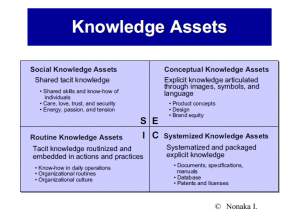Corporate Knowledge is a Corporate Asset
There are three types of knowledge that I want to address is this article: Tacit, Tribal and Corporate Knowledge. Allow me to provide “my” definition of each.
Tacit knowledge is the knowledge that someone has learned about something but isn’t shared or documented. It is often the knowledge they have about a business process that isn’t identified within an operators or process manual that makes that business process run more efficiently. If the individual having that tacit knowledge, leaves or is transferred, it will negatively affect that business process, as those who step in to replace that individual simply won’t have that knowledge or experience to use. We saw an example of this when a woman with over 20 years’ experience of running a production line at Texas Instruments retired. It cost Texas Instruments over $200,000 and months of lost productivity to recover from the loss of the tacit knowledge she had. This can affect any position and department within an organization.
Tribal knowledge is undocumented knowledge that someone has learned and has shared that knowledge with a small group of individuals within their tribe, their social, business, or work group, but isn’t widely known, or available throughout the whole organization. Again, like the tacit knowledge mentioned above, if that knowledge is lost it will have the same effect.
Corporate knowledge is the combined tacit, tribal, documented and undocumented knowledge that has been gained within a corporation. This knowledge goes to provide the information and knowledge by which an organization runs.
Why don’t corporations place a higher value on their corporate knowledge? The reason is that senior managers simply are not aware that it is much of a problem for their organization and those that are aware, view it as a normal part of business that they have little or no control over. In most U.S. and European college MBA programs, it isn’t even a topic of discussion to be taught. Therefore, the “C” level corporate executives today haven’t been educated that this is a problem that is important enough to address. Most aren’t aware of the negative affect it has on their bottom line and those that are aware simply view it as an acceptable loss. Yet, it is the common belief and management rhetoric that business success is dependent upon the knowledge and skills of their people, yet business organization, structure, processes and management actions conflict with that notion and rhetoric.
According to Professor Baruch Lev, of New York University in a paper he released in 2000, it suggests that in the U.S., “knowledge assets account for 6 out of every 7 dollars of corporate market value”! Your corporate knowledge is a precious commodity and should be treated as such. Its supply is abundant, but the ability to capture and use it is scarce. How will you replace the tacit or tribal knowledge of those key, job-critical employees when you have employee turnover? It’s not even when you have employee turnover that makes this problem critical. The inability to proactively capture, retain and make actionable the constantly evolving knowledge within an organization creates a critical problem with enormous negative consequences, which result in lower productivity, corporate security, efficiency, revenue and market value.
When are corporations going to wake up and realize that every day they are losing enormous amounts of time, money, experience and knowledge, simply because they haven’t recognized both the value and impact of this very important asset? Those organizations that continue to turn a blind eye to the impact this loss of knowledge has on their organizations will wake up one day to find that they are losing revenue and market share to their competitors. At least that’s the way I see it, what say you?
About the author:
Chuck Carey is an accomplished sales, marketing and business executive with more than 40 years of experience in the information technology industry. Chuck’s vast knowledge of the problems facing all types of organizations around identifying and capturing corporate knowledge makes him ideally suited to work with and consult in that area. If you would like to see if Chuck can help you and your organization please contact him through this website.


